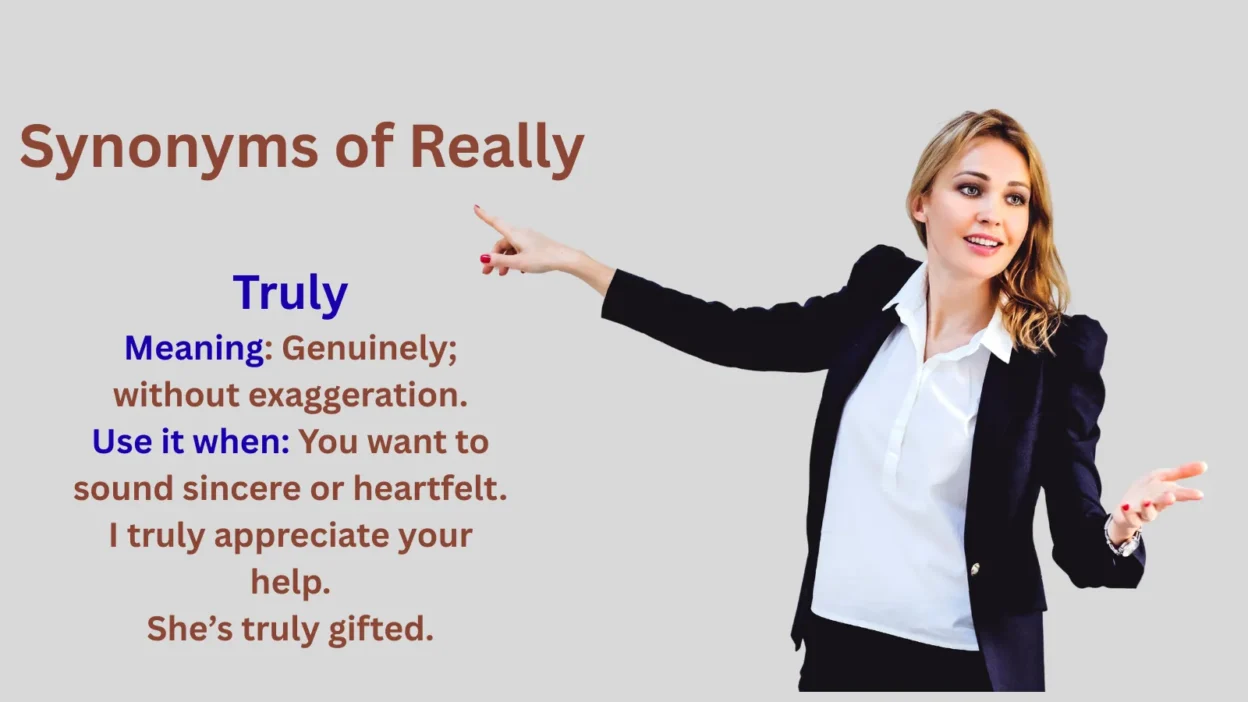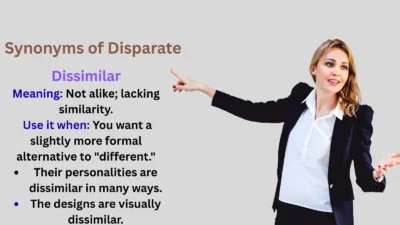The word really is one of the most common and useful words in English. It can make a statement stronger, show surprise, or soften a disagreement. For example, you might say, “She’s really smart,” or ask, “Really? I didn’t know that!” But using really too much can make your writing or speaking feel weak or repetitive. That is why learning the synonyms of really is helpful.
There are many ways to say really, depending on what you want to show—intensity, truth, surprise, or emotion. In this guide, we share 30 simple alternatives to really. Each comes with examples and tips so you can pick the right word for every situation.
Using these synonyms will make your speech and writing clearer, more precise, and more interesting for your readers.
What Does Really Mean?
Really can be used in a few different ways:
- To emphasize truth or accuracy: “I really mean it.”
- To intensify adjectives/adverbs: “She’s really good at this.”
- To express surprise or disbelief: “Really? That happened?”
Because it’s so flexible, choosing the right synonym depends on the tone, context, and what you’re trying to highlight.
Synonyms of Really (With How and When to Use Them)
1. Truly
Meaning: Genuinely; without exaggeration.
Use it when: You want to sound sincere or heartfelt.
- I truly appreciate your help.
- She’s truly gifted.
2. Seriously
Meaning: Without joking; with sincerity or intensity.
Use it when: You’re correcting or emphasizing honesty.
- Seriously, that was amazing.
- I seriously can’t believe you did that.
3. Absolutely
Meaning: Completely or unquestionably.
Use it when: You’re strongly agreeing or confirming.
- That’s absolutely true.
- I absolutely loved the film.
4. Definitely
Meaning: Without doubt; certainly.
Use it when: You want to remove uncertainty.
- We definitely need more time.
- He’s definitely the right person for the job.
5. Genuinely
Meaning: Authentically; sincerely.
Use it when: You want to stress honesty or emotion.
- I genuinely care about what happens.
- She’s genuinely kind.
6. Extremely
Meaning: To a very high degree.
Use it when: You’re intensifying an adjective.
- It’s extremely hot outside.
- He was extremely nervous.
7. Totally
Meaning: Fully; completely.
Use it when: Being casual or emphatic.
- That’s totally unfair.
- I totally forgot!
8. Completely
Meaning: Fully or entirely.
Use it when: Emphasizing thoroughness.
- You’re completely right.
- She was completely unaware of the issue.
9. Actually
Meaning: In fact, really (often used to correct).
Use it when: You want to clarify or contradict gently.
- I actually liked the movie.
- He actually finished early.
10. Very
Meaning: To a great degree (similar to really but more formal).
Use it when: You need a basic intensifier.
- She’s very talented.
- It’s very important.
11. Undoubtedly
Meaning: Without question or uncertainty.
Use it when: You’re making a strong statement.
- She is undoubtedly the best candidate.
- This is undoubtedly a success.
12. Surely
Meaning: Certainly; confidently.
Use it when: You’re offering reassurance or disbelief.
- Surely you don’t mean that.
- He’ll surely win the award.
13. Honestly
Meaning: In truth; with sincerity.
Use it when: You’re being blunt or emotional.
- Honestly, I was shocked.
- I honestly had no idea.
14. Unquestionably
Meaning: Without any doubt.
Use it when: You want to be emphatic and formal.
- He is unquestionably talented.
- That was unquestionably the right choice.
15. Decidedly
Meaning: Without hesitation; clearly.
Use it when: Emphasizing certainty or contrast.
- It was decidedly better than the first version.
- She is decidedly more confident now.
16. Positively
Meaning: Certainly; in a definite way.
Use it when: You want to sound upbeat or certain.
- I positively loved the book.
- He was positively radiant.
17. Undeniably
Meaning: Cannot be denied.
Use it when: A fact is obvious.
- She’s undeniably talented.
- That’s undeniably true.
18. Especially
Meaning: To a greater degree than usual.
Use it when: Highlighting something specific.
- I especially liked the ending.
- This part is especially important.
19. Clearly
Meaning: Without doubt or confusion.
Use it when: Emphasizing something obvious.
- He’s clearly in charge.
- That’s clearly a mistake.
20. Evidently
Meaning: Obviously or apparently.
Use it when: You want to point to obvious proof.
- He was evidently upset.
- She’s evidently prepared.
21. Overwhelmingly
Meaning: To a great extent or majority.
Use it when: You’re describing a large impact or support.
- The response was overwhelmingly positive.
- They were overwhelmingly in favor.
22. Incredibly
Meaning: Extremely; almost unbelievably.
Use it when: Adding excitement or surprise.
- She’s incredibly fast.
- That was incredibly helpful.
23. Remarkably
Meaning: Worthy of attention; surprisingly.
Use it when: You want to show unexpected intensity.
- He’s remarkably calm under pressure.
- The room was remarkably quiet.
24. Seriously
Meaning: (Repeated intentionally) To show intensity or disbelief.
Use it when: You need emphasis in casual speech.
- Seriously, you have to try this.
- That’s seriously impressive.
25. Truly
Meaning: (Repeated for contrast) As a genuine intensifier.
Use it when: Emphasizing authenticity.
- A truly unforgettable experience.
- This is truly extraordinary.
26. Exceptionally
Meaning: Beyond the norm.
Use it when: Emphasizing a standout quality.
- He’s exceptionally bright.
- That’s an exceptionally hard decision.
27. Thoroughly
Meaning: Completely or fully.
Use it when: You want to show completeness.
- I’m thoroughly impressed.
- She thoroughly enjoyed the trip.
28. Purely
Meaning: Completely; solely.
Use it when: You want to stress motivation or simplicity.
- It was purely accidental.
- She did it purely out of kindness.
29. Deeply
Meaning: Intensely or emotionally.
Use it when: Describing strong emotional states.
- I’m deeply grateful.
- They were deeply moved.
30. Wildly
Meaning: Extremely or uncontrollably.
Use it when: Adding dramatic flair.
- That idea is wildly popular.
- He’s wildly unpredictable.
How to Choose the Right Synonym
Here’s a quick guide:
For Intensity or Strength
- Use: extremely, absolutely, totally, undeniably
Emotion or Sincerity
- Use: truly, genuinely, deeply, honestly
Certainty or Fact
- Use: definitely, clearly, unquestionably, evidently
Surprise or Enthusiasm
- Use: incredibly, remarkably, wildly
Formal or Polished Writing
- Use: undoubtedly, exceptionally, decidedly, thoroughly
Conclusion:
The word really is helpful, but using it too much can make your writing or speech feel weak. By using synonyms of really, like truly, genuinely, absolutely, or indeed, you can make your words stronger, clearer, and more precise. Some synonyms show intensity, while others show truth or surprise.
Choosing the right synonym helps you express yourself clearly and keeps your language fresh. With these alternatives, your sentences will sound more lively, natural, and engaging.
Practicing them will make it easier to pick the perfect word every time. Using these synonyms also helps avoid repetition and makes both casual and formal writing more polished.





